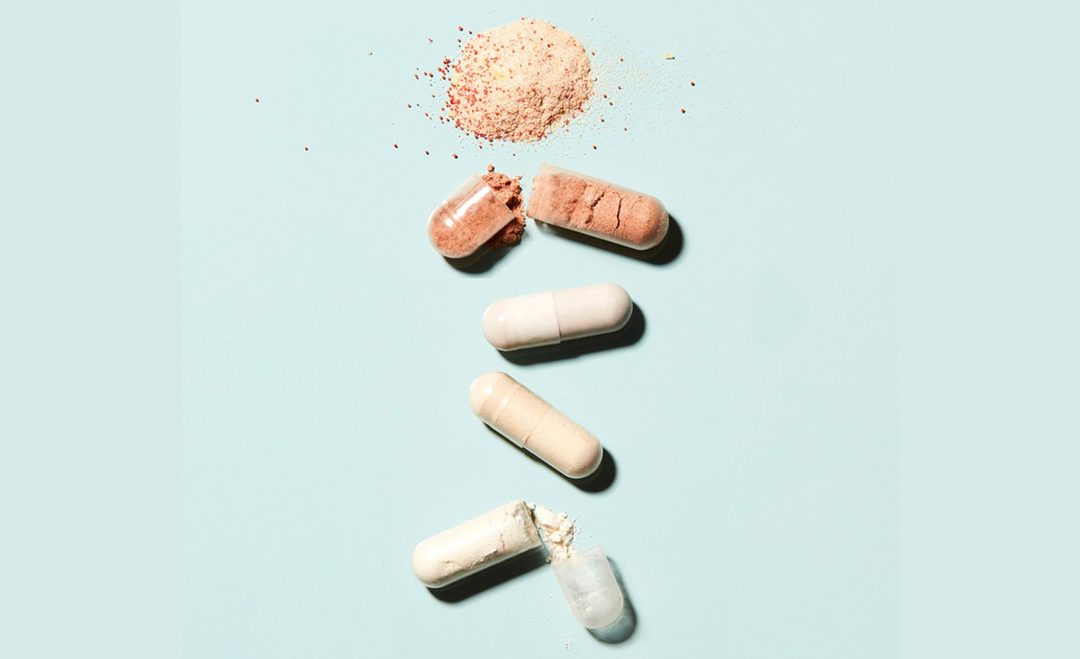— With Beauty Benefits

Dietary supplements aren’t exactly new news. The supplement market in the U.S. is currently worth $133 billion, according to Zion Market Research, and a crop of new start-ups like Care/Of and Ritual will now deliver personalized vitamin assortments to your doorstep. Formulas with more holistic ambitions, focused on wellness and beauty, have also been steadily on the rise.
Last fall, Gwyneth Paltrow entered the game with a line of five supplements, including Goopglow ($60), a powder infused with antioxidants — CoQ10 and vitamin C among them — that promises to revitalize your complexion and defend against oxidative damage.
But the star ingredients of the latest supplements are less frequently spotted on drugstore shelves. Riding the wave of interest around clean eating as a means to looking better, a new offering of capsules and powders is harnessing the power of obscure superfoods and powerful nutrients — from restorative purslane to skin-balancing probiotics.
For example, there’s been a spike in supplements formulated to regulate your digestive system. Rose-Marie Swift, the makeup artist and founder of the natural brand RMS Beauty, has long been a raw-food enthusiast and is known for meticulously researching her ingredients. Last month, she launched her first line of supplements. The Women’s Digestive Enzyme ($64) contains proteases to “help break down your food, allowing for better nutrient absorption,” Swift explains, which in turn lightens your metabolic load, and is also “very anti-aging for the body.” Or consider naturopathic doctor Nigma Talib’s Healthy Flora ($65), a capsule filled with 10 billion strains of lactobacillus acidophilus DDS-1 — one of the most well-researched probiotics, she says, and something of a superstar bacteria — to balance your gut, along with anti-aging grape seed extract. In April, the London-based practitioner will release Beauty in a Bottle, a mix of vitamins to strengthen hair, skin and nails, as well as Skin Immortal Collagen Plus, an ingestible form of firming collagen.
For the truly committed, it would seem no ingredient is off the table. The German physician Barbara Sturm, M.D. starts her day with a fresh glass of purslane, the leafy green that’s found in her skin care products, to fight wrinkle-causing inflammation. Realizing that this tonic might not be for everyone, she created Skin Food ($95), a tablet with a concentrated dose of the plant that’s also rounded out with skin-protecting Japanese knotweed root and hydrating glucosamine. “It’s an efficient way to ingest a high level of antioxidants, in a very compact pill,” notes New York City dermatologist Rachel Nazarian, M.D. “It’s likely useful for anti-aging.” And purslane is no common weed, she says. “It has significant amounts of beta-carotene, vitamin C and antioxidants,” along with “high levels of omega-3 fatty acids — five times higher than spinach.”
For Europeans, taking superfood supplements is far from a fringe concept. Pharmacies there have been stocking detoxifying milk thistle and skin-renewing spirulina for quite some time, alongside other body-enhancing fixes like cellulite creams and compression tights. The cult Parisian skin care brand Biologique Recherche recently teamed up with French nutritionist Pascale Modaï to create Griffonia & L-Tyrosine ($111), a medicinal-sounding pill formulated with Griffonia simplicifolia plant extract and an amino acid — together they work as precursors to dopamine, noradrenaline and serotonin, which might regulate mood and motivation.
Beauty supplements are still a bit of a wild card — they’re unregulated by the U.S. Food and Drug Administration, and the results might only stem from a placebo effect. Jenifer Johnson, M.D., an internal medicine physician in Rye, New York recommends running anything you plan to take long-term by an expert. She adds: “I would rather see people invest the time and energy into improving their diet than trying to find it all in a pill.”
The article was published first in the New York Times.

